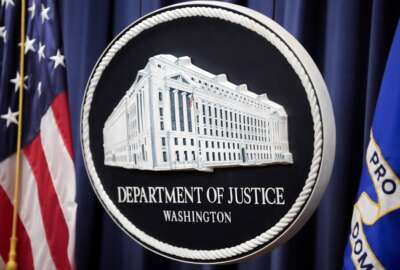Senate hold on senior military promotion comes to an end
Senators voted Tuesday to confirm Army Lt. Gen. Ronald Clark for a fourth star and as commander of U.S. Army Pacific.
- The latest Senate logjam holding up a senior military promotion has come to an end. Senators voted Tuesday to confirm Army Lt. Gen. Ronald Clark for a fourth star and as commander of U.S. Army Pacific. His nomination has been awaiting Senate action since July but had been on hold because of an objection by Alabama Senator Tommy Tuberville. Tuberville said he was concerned that Clark had been one of the Defense Department officials who failed to notify Congress about Defense Secretary Lloyd Austin’s recent hospitalization, but eventually dropped his objection after a one-on-one conversation with the general. (Senate hold on senior military promotion comes to an end - Associated Press)
- Congress passes a stopgap spending bill to avoid a government shutdown. Lawmakers passed a continuing resolution (CR) that keeps most government spending at current levels through Dec. 20. The bill also prevents a 22% pay cut for 11,000 Foreign Service officers and other federal employees working overseas. The CR averts a lapse in funds that pay overseas employees close to what they’d make while working in Washington, DC. The Senate is looking to reauthorize that fund for other another two years under a must-pass defense authorization bill. (Congress passes stopgap bill to avoid government shutdown, 22% pay cut for feds overseas - Federal News Network)
- The Defense Department will allocate 500 million dollars annually toward women’s health research, primarily through the Congressionally Directed Medical Research Programs. Beginning Oct.1, the department will require women's health to be considered throughout the entire research process for projects funded through the program. There’s also a commitment to invest more through the Small Business Innovation Research and Small Business Technology Transfer programs to support startups and small businesses involved in research and development on women's health.
(DoD to address disparities in women’s health research - Department of Defense)
- Lawmakers approved thousands of military promotions before they leave town until November. The Senate on Tuesday confirmed Lt. Gen. Steven Nordhaus as the next chief of the National Guard Bureau. Nordhaus, who will be promoted to a four-star general, inherits the Guard top position from Gen. Daniel Hokanson, who retired from federal service in August. Lt. Gen. Ronald Clark’s promotion to lead Army forces in the Pacific was also cleared after Sen. Tommy Tuberville (R-Ala.) placed a hold on his nomination earlier this month. In addition, lawmakers confirmed Vice. Adm. Alvin Holsey to lead the U.S. Southern Command and Lt. Gen. Randall Reed to lead the U.S. Transportation Command.(Senate approves top military nominations ahead of election - Federal News Network )
- Federal employees are about to see a major increase in their insurance costs. Starting in 2025, enrollees in the Federal Employees Health Benefits (FEHB) program will pay 13.5% more, on average, toward their health care premiums. That amounts to nearly $30 more in their biweekly insurance payments. The Office of Personnel Management (OPM) released the new rates this week, saying the increase for 2025 reflects changes in the market over the last year. Enrollees in the new Postal program will pay 11.1% more toward their health care premiums. OPM’s announcement, comes several weeks ahead of the start of Open Season when participants can make changes to their health care options for 2025. This year, Open Season will run from Nov. 11 to Dec. 9.
(In 2025, FEHB enrollees will see largest health premium increase in over a decade - Federal News Network )
- Federal employees looking to grow their families will soon see more insurance options for fertility treatments. Starting in 2025, two nationwide plans in the Federal Employees Health Benefits (FEHB) program will offer more comprehensive coverage of in vitro fertilization (IVF). Feds will be able to use $25,000 toward covering the cost of IVF through either Blue Cross Blue Shield or GEHA. The benefit would be included on top of the baseline requirements for FEHB carriers to cover costs of IVF medications. Many individuals rely on IVF to start their families, but the treatments can often cost tens of thousands of dollars out of pocket.(FEHB enrollees will see more choices for comprehensive IVF coverage in 2025 - Federal News Network)
- Agencies would have to establish and publish workplace protections in the event of another public health emergency declared for an infectious disease under A new bill in Congress. Senator Mark Warner and Congressman Gerry Connolly's new legislation details specific steps agencies would have to take to do more to protect employees. The Chai Suthammanont Healthy Federal Workplaces Act would require agency plans to include guidelines for testing, cleaning, occupancy limits, use of personal protective equipment, notification of individuals who may have been exposed to a disease and protections for employees who travel off-site. It also would ensure accountability and oversight by requiring the Office of the Inspector General for each agency to report to Congress on their implementation plans.(Warner, Connolly introduce legislation to promote federal worker safety - Senator Mark Warner )
- Health care employees at the Department of Veterans Affairs would get full collective bargaining rights under a bill led by 100 House lawmakers. The legislation covers VA registered nurses, physicians, dentists and physician assistants. House VA Committee Ranking Mark Takano is leading the bill. The bill passed the House in 2022 but didn’t make it through the Senate.
- House lawmakers want to bridge the cyber workforce gap with a new scholarship program. The Cybersecurity and Infrastructure Security Agency (CISA) would oversee an ROTC-like cyber scholarship program under the Cyber PIVOTT Act. The House Homeland Security Committee approved the bill on Wednesday. Under the legislation, the CISA program would give students scholarships for two-year degrees in exchange for two years of government service once they graduate. The program would focus on community colleges and technical schools, and require the programs to emphasize skills-based, hands-on training. (House cyber workforce bill pushes two-year degrees for gov service - Federal News Network )
- NASA has a new timeline for its SEWP VI governmentwide contract. Just about a month after a "strategic pause" of the SEWP VI GWAC, NASA is ready to move forward. The SEWP program office will release answers to almost 6800 questions it has received so far over a three-week period in October, starting on the first. NASA said in a notice on SAM.gov, it will continue to take new questions and answer them through Nov. 4th. It will then hold an industry day for bidders in November. NASA said final bids for SEWP IV will be due Dec. 18. The strategic pause was a result of contractor complaints that the SEWP program office hadn't provided enough details for vendors to successfully bid for a spot on the GWAC.(NASA SEWP IV update - SAM.gov)
- The Cybersecurity and Infrastructure Security Agency (CISA) said hackers are taking advantage of vulnerabilities in critical water systems. In a new cyber alert this week, CISA said it is responding to active exploitation of internet-connected operational control systems. That includes systems relied upon by the water and wastewater sectors. The cyber agency is urging water utilities and other organizations to limit the exposure of operational systems to the open internet. Earlier this year, CISA warned that pro-Russia hacktivists were taking advantage of basic cyber vulnerabilities to threaten critical infrastructure operations.
Copyright © 2025 Federal News Network. All rights reserved. This website is not intended for users located within the European Economic Area.
Michele Sandiford
Michele Sandiford is a digital editor at Federal News Network.






